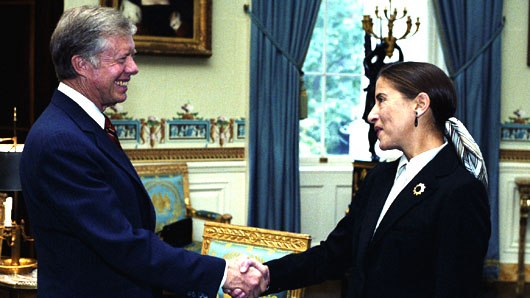Special to WorldTribune.com
Justice Ruth Bader Ginsburg is “notoriously” celebrated for championing equal rights for women. But the philosophy that launched her career and turned her into a liberal icon does not apply to the unborn and other unwanted people.

“RBG” — the latest documentary that portrays Ginsburg as a “superhero” — conveniently overlooks such glaring inconsistencies and hypocrisy in her judicial worldview including an interview that seemed to condone genocide.
In “RBG,” directors Betsy West and Julie Cohen chronicle Ginsburg’s personal struggle as a female law student to her current liberal phenom status. Her rise to fame as the second U.S. Supreme Court Justice in 1993 is remarkable — especially given the era she grew up in. In 1956, Ginsburg was only one of nine women enrolled at Harvard Law School and was reportedly rebuked by the dean for “taking a spot from a qualified man.”
The directors believe Saint Ginsburg is not an “evildoer,” “monster” or “witch,” as her detractors claim at the beginning of the movie. She is also not “an absolute disgrace to the U.S. Supreme Court,” as then-presidential candidate Donald Trump said. Rather, Ginsburg is an intellectual Goliath correcting the injustices of sexual inequality.
Throughout the film, we hear the 85-year-old justice read excerpts from several of her now-iconic Supreme Court dissents. In her soft-spoken manner, she schools the justices like “a kindergarten teacher” — as she puts it — on gender discrimination and the need for equality.
“I ask no favor of my sex. All I ask of my brethren is that they take their feet off our necks,” implores Ginsburg, quoting 19th century abolitionist Sarah Grimke who fought for equal rights in 1873.
This would be Ginsburg’s mantra throughout the years as she defied the male-dominated court. Her rebel stances became so popular, superfan Shana Knizhnik coined the moniker “Notorious RGB” in 2013 — a play on rebel rapper Notorious B.I.G. who was murdered in 1997.
Despite some setbacks, Ginsburg paved the road to equality on key issues. In 1972, Ginsburg co-founded and directed the Women’s Rights Project at the American Civil Liberties Union (ACLU). With the ACLU, she participated in over 300 gender discrimination cases and won five of the six cases she argued before the Supreme Court.
She strategically picked unlikely cases — even those discriminating against men — to make a case for equal rights for women. She based her arguments on the Equal Protection Clause and used the word “gender” instead of “sex” to underscore her point. This shrewd strategy prevailed.
In Reed v. Reed, Ginsburg wrote the brief in which the Supreme Court extended the protections of the Equal Protection Clause of the Fourteenth Amendment to women. In Frontiero v. Richardson, she successfully argued female service members can obtain an increased housing allowance for their husbands as men did for their wives. In Weinberger v. Wiesenfeld, Ginsburg fought and won for Social Security benefits for widowers, previously only given to women.
But somewhere along the way, Ginsburg radically rejected championing equality for all by disregarding this same right for the unborn. In her 1993 confirmation hearing, she said, “A woman’s control of her own body, her choice whether and when to reproduce, it’s essential to women and it’s most basic for women’s health.” For Ginsburg, only women have rights, not babies.
In a shocking 2009 New York Times interview, Ginsburg said she had assumed Roe v. Wade would help eliminate “populations that we don’t want to have too many of.” Ginsburg implicitly shared the “concern about population growth” and was not bothered that certain “populations” could be indiscriminately targeted and killed.
Ginsburg also supports taxpayer funding of abortion. In 2014, she chastised the U.S. Supreme Court for ruling in Sebelius v. Hobby Lobby Stores, Inc., that Hobby Lobby should not be forced to pay for abortion-inducing drugs in employee health care plans.
In Whole Woman’s Health v. Hellerstedt in 2016, Ginsburg concurred with the majority opinion to strike down a Texas bill (HB2), which required abortion providers to adhere to strict health and safety standards. In the landmark ruling, the court said the regulations — which shut down many abortions clinics — placed an undue burden on women’s rights.
In her concurring opinion, Ginsburg stressed the importance of adhering to Roe v. Wade and Planned Parenthood of Southeastern Pa. v. Casey. She also said laws like HB2 “strew impediments to abortion.”
Without a doubt, “RBG” shows there is much to admire in Ginsburg’s personal struggle to survive and thrive in a man’s world. But it fails to show the hypocrisy and double standard of the woman they turned into a rock star.
Ultimately, Ginsburg’s legacy savagely stomps on the necks of the unborn and potentially other “populations that we don’t want to have too many of.”
Occasional columnist Loredana Vuoto is a former speechwriter for the Senate Republican Conference and editor at The Washington Times.
